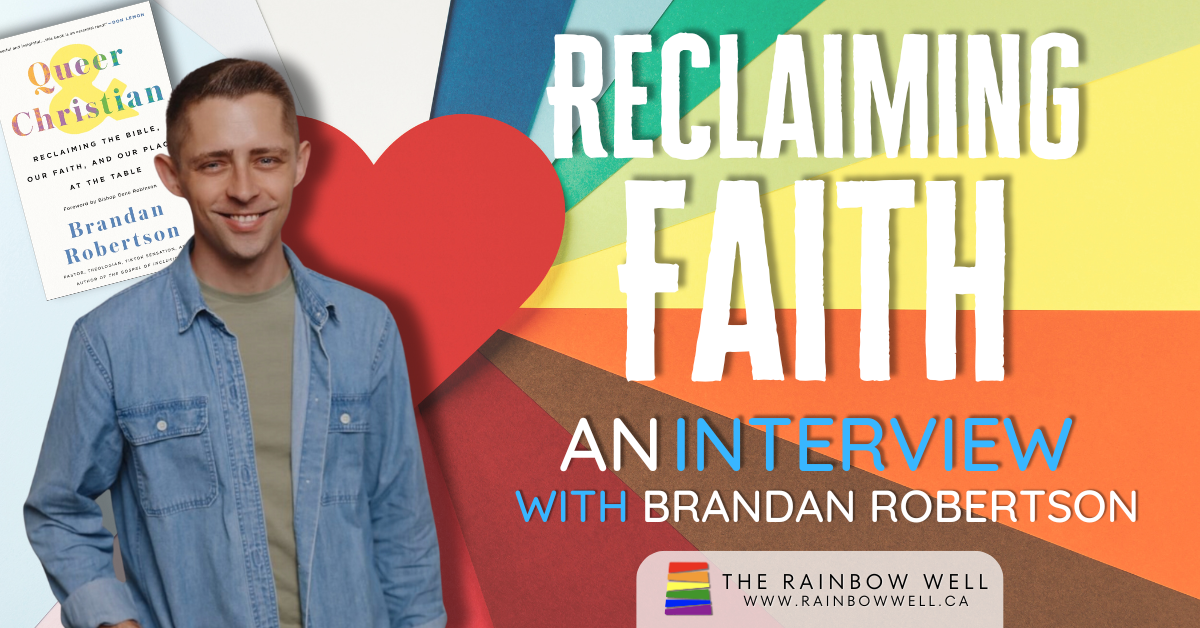Reclaiming Faith: An Interview With Brandan Robertson

Over the years, many voices in the queer Christian world have distinguished themselves, bringing their unique passion and insight. Among those, I have respected the work of Brandan Robertson for many years. He brings a unique gentleness to these conversations that are simultaneously full of grace, yet completely uncompromising. I was thrilled to interview him.
Rev. Brandan Robertson is a renowned author, activist, and public theologian who serves as Pastor of Sunnyside Reformed Church in New York City. Known as the “TikTok Pastor” for his extensive digital influence, he engages over 250k followers with inclusive theological content, amassing more than 6 million views.
A passionate advocate for 2SLGBTQIA+ inclusion and social justice, Robertson has authored or contributed to many books, including the critically acclaimed “True Inclusion: Creating Communities of Radical Embrace”. His work has appeared in major outlets like TIME, The Washington Post, and CNN, and he regularly speaks on platforms such as The White House, Oxford University, and global faith forums. Currently pursuing a PhD in Biblical Studies, Robertson continues to lead conversations at the intersection of faith, sexuality, and social renewal.
Jamie Arpin-Ricci: How did your journey as a public theologian and activist begin, and what led you to focus on the intersections of spirituality, sexuality, and social renewal?
Brandan Robertson: It was an accident. Since the beginning of my faith journey as a teenager, I’ve been sharing my thoughts about Christianity online. But when I was publicly outed in 2015 and received significant backlash from the evangelical community that raised me, I found myself becoming an accidental activist—confronting the fear-based religion that causes so many to be so unjust towards queer people and other minority communities.
I also never expected to be focused on LGBTQ+ inclusion, even early on in my queer Christian journey, but the more I studied the scholarship related to sexuality and the Bible, the more I realized that so much of the best scholarship had not made it out into the public sphere, allowing non-affirming interpretations to flourish. So over the past decade, I’ve been working to learn more, and share what I learn with the Church, the general public, and even those who make policies related to the wellbeing of LGBTQ+ people. It’s remarkable how much a non-affirming theology really impacts every aspect of our society—far beyond the pews of the church.
My heart and hope is to share good Biblical scholarship with the world and empower queer people to reclaim the Bible, our faith, and our place at the table.
JAR: TikTok often gets dismissed as a “kids dance app.” However, you have been able to reach and influence many people there. Why do you think that is?
BR: That’s what I thought too. Yet during the pandemic, I began seeing other progressive clergy getting on the app and engaging with the growing audience of TikTok, so I began posting what I thought were just nerdy theological hot takes, and soon found that many millions of people were actually very interested in learning and engaging with a progressive Christian theology and worldview.
And of course, over the past few years, many conservative, non-affirming pastors and creators have been getting on the app and gaining a massive following—so it feels more important than ever to offer a different perspective on the app in order to ensure that no one—young person or adult—walks away believing that they are condemned by God because of who they are.
There is a hunger for depth in our day—and I really encourage all clergy and theologians to use the modern tools we have to share our deep insights online—this is modern evangelism, and it really does reach the world with the good news of Jesus.
JAR: Of your books on gender and sexuality, which one was the most impactful for you to write? Why?
BR: My book “The Gospel of Inclusion” is actually my Masters Thesis from Iliff School of Theology—this means that I basically spent three years learning, writing, and refining the arguments to make sure they offered truly good scholarship and what I hoped was a fresh perspective on LGBTQ+ inclusion. Of all of my books, I think that one is the most impactful thus far.
But I am about to release my “final word” on LGBTQ+ inclusion in the church, a new book called “Queer and Christian: Reclaiming the Bible, Our Faith, and Our Place at the Table”. This book has been the most difficult to write, but I think it is by far the most important book I’ve ever written. It represents an evolution in my own scholarship and is written in a way that is intended to be accessible to the general public. I hope it will generate life-giving conversations for queer people and our allies alike.
JAR: While there is a hopeful movement toward inclusion, we’re also in a time of increasing discrimination and harmful policy. Why do you think that is? Are you hopeful? Cautious?
BR: Every time there is a movement towards progress, there is always an equal and opposite pushback. The discrimination we are seeing at this moment is very real and impacts many people. But the truth is that, as Bishop Gene Robinson declared at Washington National Cathedral a few years ago, “We’ve won.” I really believe that the cultural tide has turned, I believe that we’re in a moment where more and more people are coming to realize that the non-affirming interpretation isn’t the only or the best interpretation of scripture, and that the vast majority of people are evolving—albeit slowly—on how they view LGBTQ+ people and our lives and love.
That’s not to say there isn’t a lot more work to do—of course there is. But no one can stop the movement of God’s Spirit, and it’s clear to me that God is drawing us towards a more inclusive vision of the Church and the world.
JAR: What are some of the most important practices of allyship? Where do you see the biggest “gaps” in allyship today?
BR: The most vital lesson for allies is to cease trying to primarily be “a voice for the voiceless” and instead to help give the voiceless back their voice. In other words, we are moving into a time where there are droves of queer Christians who are willing to stand up and speak up about our lives and experience, and it’s time to ensure those voices are platformed, rather than having allies speak on behalf of us. The way change occurs is when those who have been marginalized are uplifted and given the ability to teach, lead, and speak on our own—and so every community should be seeking to find ways to empower the queer people in their midst to use our gifts and tell our stories for ourselves.
JAR: Name three resources (books, films, etc.) that have been critical for you in your affirming convictions.
BR: There are of course far too many to name. But I would say that Cheryl Anderson’s book “Ancient Laws and Contemporary Controversies”, J.R. Daniel Kirk’s work broadly but especially his book “Jesus Have I Loved, But Paul?”, and the scholarship of Joseph Marchal (he’s written many books and articles) on queer readings of Scripture have been the most transformative works along my own journey.
JAR: What’s in the future for you? Any new books in the works?
BR: My new book “Queer & Christian” releases next May 2025, and I am going to spend a couple of years cultivating conversations around that book and the move from “affirming theology” to “queer theology.” We’ve also launched The DevOUT Foundation, which we hope will help us to generate more queer affirming scholarly content for the internet, while also helping to combat the rising tide of conversion therapy and ex-gay narratives that we’ve seen in recent years. Beyond that, I continue to pastor a lovely local church here in New York City and am finishing up my PhD in Biblical Studies—ultimately, I would love to teach undergraduate theology and Biblical studies for a season. So that’s where I am aiming at this moment!
JAR: Thanks, Brandan!
You can find links to Brandan’s resources Here, as well as at his site, Here.
. . .
Interview by Jamie Arpin-Ricci (he/him), founder of The Rainbow Well
Please sign up for our newsletter here.

